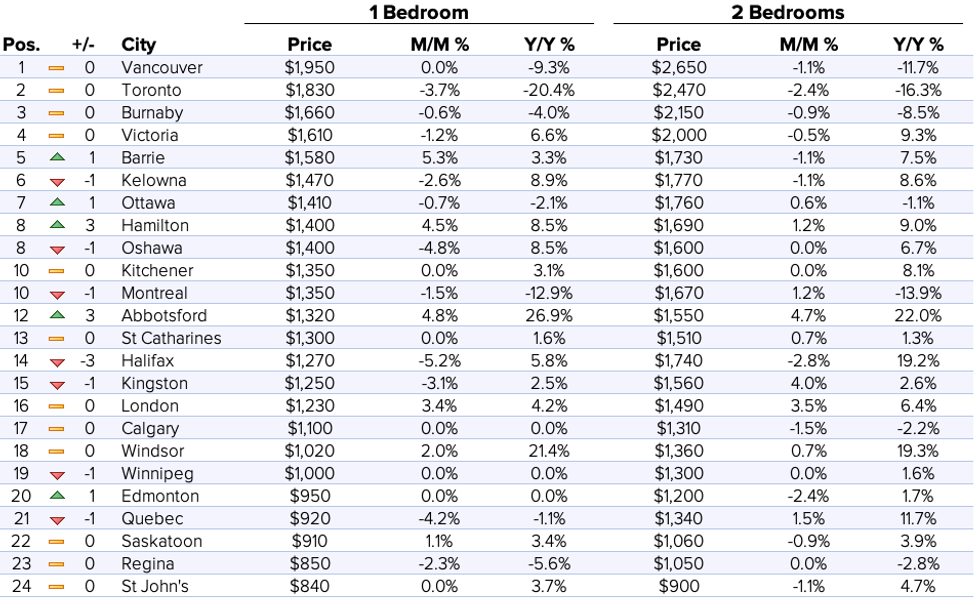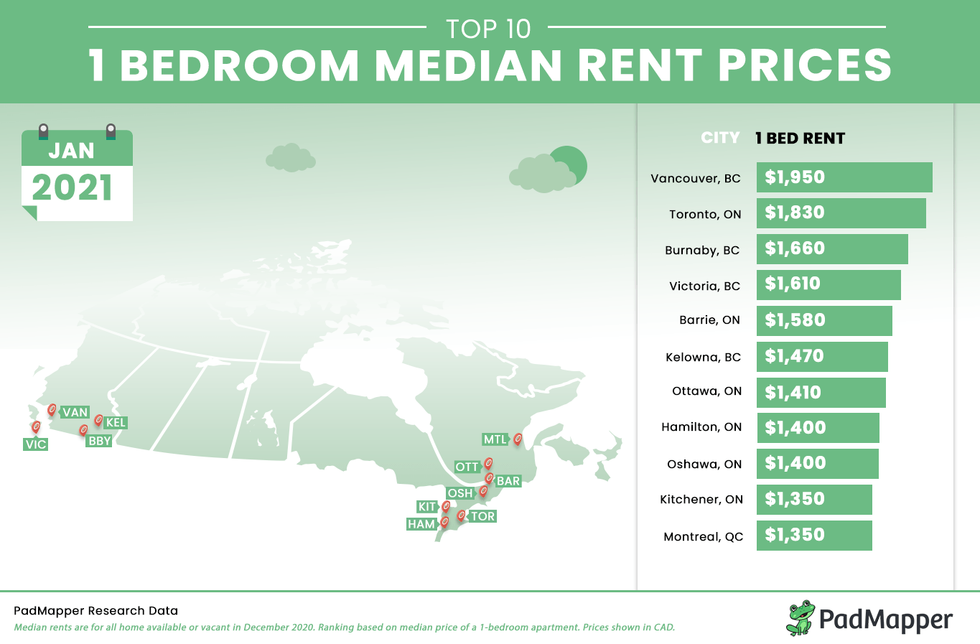Temperatures are dropping, as are monthly average rents in Canada's largest city, with 1-bedroom rents falling nearly 4% month-over-month -- while rents are down over 20% year-over-year.
On Thursday, Padmapper released its January national rent report, which analyzed hundreds of thousands of listings last month to examine median rent prices across the 24 largest cities in the country.
According to the recent numbers, overall, 11 cities had a downward monthly rent price change, while six saw increases, and seven remained flat.
This comes amid the winter months, which tends to be the slower-moving time of the year for real estate, as not many renters are moving during the holidays -- a trend that's reflected in how the selected markets performed in this report, with nearly half of the cities experiencing falling rents.
READ: Average Toronto Rent to See Modest Rise in 2021, Double-Digit Growth in 2022
As it stands, the median cost for a 1-bedroom rental in Toronto was $1,830 in January -- a decline of 3.7%, while rent for 2-bedrooms also fell 2.4% to $2,740.
But more notably, on a year-over-year basis, one-bedroom rent in Toronto is down 20.4% -- the largest yearly dip in the nation -- while 2-bedrooms are down 16.3% annually.
However, despite these record lows, it should be noted that Toronto still holds the second-highest ranking for the most expensive 1-bedroom cost median, and falls below Vancouver’s 1-bedroom price-point — $1,950 — by only $120.
"Looking ahead, while prices will most likely continue to drop in pricey markets like Toronto, as many people are moving out in favour of cheaper markets, these declines may continue at a slower rate than what we've seen in the last few months, "PadMapper analyst Crystal Chen told Toronto Storeys.
"As there will likely be a good amount of new renters interested in moving to these expensive markets due to the unheard-of discounted prices, there may be some rent stabilization in the future. However, rents will remain at its low point for Toronto at least until the vaccine is readily available to the general population and people feel more comfortable living in a big city again."
Over in the 905, where many Torontonians are relocating to as they search for more space and affordability, price plummets haven’t been nearly as dramatic. In some cases, numbers have actually risen, but, unsurprisingly, are still much lower than those we see here in Toronto.
Oshawa saw 1-bedroom rent fall 4.8%, settling at $1,400, and inched down one spot to become the 8th most expensive city to rent.
One-bedrooms in Hamilton have gone up 4.5% in median price y-o-y, reaching $1,400 in January. Meanwhile, 2-bedrooms are up 1.2% to $1,690.
Seeing little to no change is St. Catharines, which remained flat, with 1-bedroom rent undergoing a 0% change in January to sit at $1,300, while 2-bedroom rents inched up 0.7% to $1,510.

On the other side of the spectrum, Abbotsford and Windsor saw the largest jumps in rent since this time last year, up 26.9% and 21.4%, respectively.
And while the rent decline has been a trend for many months now in Toronto, we can't expect this to last.
As such, a recent report from TorontoRentals.com and Bullpen Research & Consulting Toronto suggests that the falling rent in Toronto may have an end in sight, as Bullpen Research & Consulting forecasts double-digit rent growth for apartments (condo and rental) in 2022, following a modest rise in 2021.
“Our forecasts call for even lower rents in the first half of 2021, with a modest rise in the second half of the year,” said Ben Myers, president of Bullpen Research & Consulting. “However, we expect a substantial bounce back in 2022, with rents increasing by double-digits with a mad rush back into the downtown Toronto market.”
How does that old saying go again? ‘What goes up, must come down' and, in this case… go back up again.






















